Grain / Cereal Crops Names Meaning & Pictures | Necessary Vocabulary
Grain Crop
Grain / greɪn / (গ্রেইন) n [grains are small, hard, dry seeds from a plant, especially a plant like grass, with or without attaching hulls or fruits layers, harvested for human or animal consumption. Agronomist also calls the plants producing such seeds “grain crops<দানাদার শস্য>”. The two main types of commercial grain crops are cereals such as wheat and rye, and legumes such as beans and soybeans. After being harvested, dry grains are more durable than other staple foods such as starchy fruits and tubers. This durability has made grains well suited to industrial agricultural products, since they can be mechanically harvested, transported by rail or ship, stored for long periods in silos, and milled for flour or pressed for oil. Thus, major global commodity markets exist of maize, rice, soybeans, wheat, and other grains, but not for tubers, vegetables, or other corps] (শস্যকণা; দানা): A few grains of rice
Grain Crop Related Necessary Vocabulary Notes
Ø Hull / hʌl / (হাল্) v [to remove the outer covering of peas, beans, etc. stem and leaves from some fruits, seeds] (<কোনো কোনো ফল, শিম ইত্যাদির> খোসা ছাড়ানো): First wash and hull the strawberries.
Ø Harvest / ˈhɑːrvɪst / (ˈহাঃর্ভিস্ট্) v {Pt. Pp. harvested / ˈhɑːrvɪstɪd / (ˈহাঃর্ভিস্টিড্)} [to pick and gather a crop, or to catch birds, animals or fishes to eat] (ফসল কাটা বা তোলা): In the USA, winter wheat is harvested in the early summer.
Ø Consume / kənˈsuːm / (কএˈনছূম্) v {Pt. Pp. consumed / kənˈsuːmd / (কএˈনছূম্ড্)} [to eat or drink, especially a lot of something] (ভোগ করা; আহার বা পান করা): Before he died he had consumed a large quantity of alcohol.
<NOUN> Consumer / kənˈsuːmər / (কএনˈছূমএর্) n [a person who buys goods or uses services for their own use] (ভোক্তা; ভোগ্যপণ্য ব্যবহার কারী): Consumer demand/rights
<NOUN> Consumption / kənˈsʌmpʃn / (কএনˈছামপশ্ন্) n [the act of buying and using products by someone] (ভোগ; ভোগকৃত দ্রব্য): As a nation, our consumption of junk food is horrifying.
Ø Agronomist / əˈgrɑːnəmɪst / (এˈগরাঃনএমিস্ট্) n [a scientist who studies the relationship between crops and the environment] (কৃষিতত্ত্ববিদ):
Ø Durable / ˈdʊrəbl / (ˈডুরএব্ল্) adj [able to last for a long time without breaking or getting weaker] (টেকসই; মজবুত): Painted steel is likely to be less durable than other kinds.
Ø Staple / ˈsteɪpl / (ˈস্টেইপ্ল্) adj [basic or main; standard or regular] (প্রধান পণ্যদ্রব্য): The staple diet here is mutton, fish, and boiled potatoes.
Ø Starch / stɑːrtʃ / (স্টাঃরচ্) n [a white food substance found in potatoes, flour, rich, etc.] (মাড়; শ্বেতসার): You need to cut down on starches.
<ADJ> Starchy / ˈstɑːrtʃi / (ˈস্টাঃরচি) adj [(of food) containing a lot of starch] (মাড়যুক্ত; শ্বেতসারযুক্ত): Starchy food like rice and bread.
Ø Suited / ˈsuːtɪd / (ˈছূটিড) adj [right or appropriate for Sb/Sth] (উপযুক্ত; উপযোগী): This diet is suited to anyone who wants to lose weight fast.
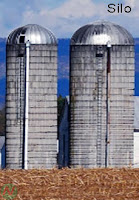 |
| Silo |
Ø Silo / ˈsaɪloʊ / (ˈছাইলৌ) n [a large, tall, round tower on a farm used for storing grain or winter food] (খাদ্যমজুদ ঘর):
Ø Mill / mɪl / (মিল্) v {Pt. Pp. milled / mɪld / (মিল্ড্)} [to crush grain into flour or another substance into power] (কলে গুড়া করা/ভঙ্গা/পেষা): The grain is still milled locally.
Ø Press / pres / (প্রেছ্) v {Pt. Pp. pressed / prest / (প্রেছ্ট্)} [to squeeze the juice out of fruit or vegetables by using force or weight] (নিংড়ানো/চেপে রস বেরকরা):
Ø Commodity / kəˈmɑːdəti / (কএˈমাঃডএটি) n [a product or a raw material that can be traded, bought and sold] (পণ্যদ্রব্য; প্রযোজনিয় সামগ্রী): Crude oil is the world’s most important commodity.
Ø Exist / ɪgˈzɪst / (ইগˈজিছট্) v {Pt. Pp. existed / ɪgˈzɪstɪd / (ইগˈজিছটিড্)} [to be real; to be present in a place or situation] (অস্তিমান বা বিদ্যমান থাকা): The charity exists to support victims of crime.
1. Cereal
Cereal / ˈsɪriəl / (ˈছিরিএল্) n 1. [A cereal is one of the various types of any true grass cultivated for the edible components of its grains, which can be eaten or are used to make flour or bread. Cereal grains are grown in greater quantities and provide more food energy worldwide than any other type of crop. They are therefore stapled crops. When refined by the removal of the bran and germ, the remaining endosperm is mostly carbohydrate. In some developing nations, grain in the form of rice, wheat, maize makes up a majority of daily sustenance. In developed nations, cereal consumption is moderate and varied, but still substantial] (<ডাল বাদে>গম, চাউল ইত্যাদি দানাদার শস্য): Wheat, barley, and rye are all cereals. Cereals crops
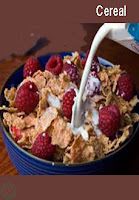 |
| 2.Cereal |
2. Cereal / ˈsɪriəl / (ˈছিরিএল্) n [Food made from the grain of cereals, often eaten for breakfast with milk] (দানাশস্য হতে তৈরী সকালের খাবার): breakfast cereals. A bowl of cereal
Ø Edible / ˈedəl / (ˈএডএবল্) adj [safe or suitable to be eaten] (ভোজ্য): Only the leaves of the plant are edible.
Ø Component / kəmˈpoʊnənt / (কএমˈপৌনএন্ট্) n [one of the several parts of which Sth is made] (<কোনোকিছু> গঠনে সহায়তাকারী অন্যতম উপাদান বা অংশ): Fresh fruit and vegetables are an essential component of a healthy diet.
Ø Removal / rɪˈmuːvl / (রিˈমূভল্) n [the act of taking Sb/Sth away from a particular place] (অপসারণ; অপনয়ন): a liquid for the easy removal of coffee stains.
 |
| Bran |
Ø Bran / bræn / (ব্র্যান) n [the outer covering of grain which is separated when the grain is made into white flour] (ভুসি): Breakfast cereal has been added bran.
Ø Germ / dʒɜːrm / (জা্র্ম্) n [(biology) the part of a plant or an animal that can develop into a new one] (অঙ্কুর):
Ø Endosperm / ˈendoʊspɜːrm / (ˈএনডৌছপা্র্ম্) n [the substance inside a plant seed that surrounds and provides food for the embryo, usually containing starch with protein one other nutrient] (<শস্যের> নির্যাশ):
Ø Sustenance / ˈsʌstənəns / (ˈছাছটএনএনছ্) n [the ability of food and drink that people, animals, and plants need to live and stay healthy and strong] (পুষ্টিকর উপাদান): There is more sustenance in wheat than in barley.
Ø Moderate / ˈmɑːdərət / (ˈমাঃডএরএট্) adj [that is neither very good, large, hot, etc. nor very bad, small, cold, etc. between the two] (মাঝারি): cook over moderate heat.
Ø Substantial / səbˈstænʃl / (ছএবˈছট্যানশ্ল্) adj [large in amount, value or importance] (সুপ্রচুর; উল্লেখযোগ্য): We were able to see a substantial improvement.
<SYN> Considerable
<SYN> Considerable
Crop
Crop / krɑːp / (ক্রাঃপ্) n [a crop is any cultivated plant, fungus, etc. that is harvested in large quantities, especially as food, clothing, livestock fodder, biofuel, medicine, or other uses. In contrast, animals that are raised by humans are called livestock, except those that are kept as pets. Major crops include sugarcane, pumpkin, maize, wheat, paddy, cassava, soybeans, hay, jute, and cotton] (শস্য; ফসল): Wheat is an important crop in Bangladesh. We are looking forward to a bumper crop (=a very large one).
<PHY> Cash crop [a crop is grown for selling, rather than for use by the person who grows it] (বিক্রর জন্য ঊৎপাদিত শস্য; অর্থকরী ফসল)
Ø Fungus / ˈfʌŋgəs / (ˈফাঙ্গএছ্) n [any plant without leaves, flowers or green coloring, usually growing on other plants or on decaying matter. Mushroom, Mould, and mildew are both fungi] (ছাতা; কোঁড়ক): Fungus can be poisonous.
 |
| Livestock |
Ø Livestock / ˈlaɪvstɑːk / (লাইভ্স্টাঃক্) n [the animals kept on a farm, for example, cows, sheep, and birds, etc.] (ব্যবহার অথবা লাভের জন্য পালিত গরু-মহিষ, ছাগল-ভেড়া; গৃহপালিতপশু):
Ø Fodder / ˈfɑːdər / (ˈফাঃডএর্) n [food that is given to farm animals] (গোখাদ্য অথবা পালিত পশুপাখির খাদ্য):
Ø Biofuel / ˈbaɪoʊfjuːəl / (ˈবাইঔফূএল্) n [fuel made from living things or their waste and used engines] (জীবাশ্য জ্বালানী): Biofuels made from sugar cane and sugar beet
Ø Contrast / ˈkɑːntræst / (ˈকাঃনট্র্যাছ্ট্) n [an obvious difference between two or more things] (তুলনা; প্রতিতুলনা):
Ø Raise / reɪz / (রেইজ্) v {Pt. Pp. raised / reɪzd / (রেইজ্ড্)} [to care for a child or young animal until it is able to take care of itself] (শস্য ও পশুপাখির লালন পালন ও বংশবৃদ্ধি করা): The farmer raises chickens and pigs.
Ø Bumper / ˈbʌmpər / (ˈবাম্পএর্) adj 1. [producing an unusually large amount] (অসাধারণরকম প্রচুর বা বৃহৎ): Farmers have reported a bumper crop this year.
 |
| 2. Bumper |
<NOUN> Bumper / ˈbʌmpər / (ˈবাম্পএর্) n 2. [a bar fixed to the front and back part of a motor vehicle to help protect it if there is an accident] (সংঘর্ষের প্রকোপ কমানোর জন্য যানবাহনের সামনে-পেছনে সংযোজিত বারণী; মটরগাড়ির বাম্পার): The cars were bumper to bumper on the road to the coast.
Grains and Cereals [in botany, grains and cereals are synonymous with caryopses, the fruits of the grass family. In agronomy and commerce, seeds or fruits from other plant families are called grains if they resemble caryopses.]
Ø Synonymous / sɪˈnɑːnɪməs / (ছিˈনাঃনিমএছ্) adj [(of words or expressions) having the same, or nearly the same meaning] (সমনামিক; সমার্থক): The words ‘annoyed’ and ‘irritated’ are more or less synonymous.
Ø Caryopsis / ˌkærɪˈəpsɪs / (ˌক্যারিˈএপছিছ্) n [(in Botany) a dry one-seeded fruit in which the ovary wall is united with the seed coat, typical of grasses and cereals] (ক্যারিআপ্সিস):
Ø Resemble / rɪˈzembl / (রিˈজেমব্ল্) v [to look like or be similar to another person or something] (অনুরুপ; মিল): The plant resembles grass in appearance.
Wheat
Wheat / wiːt / (উঈট্) n [wheat is a cereal grain with yellowish brown that is used to produce the flour for bread, cakes, etc.; originally from the Levant region of the Near East but now cultivated worldwide. World trade in wheat is greater than for all other crops combined.
Raw wheat can be ground into flour or, using hard durum wheat only can be ground into semolina; germinated and dried, creating malt; crushed or cut into cracked wheat; parboiled (or steamed), and dried. If the raw wheat is broken into parts at the mill, as is usually done, the outer husk or bran can be used several ways. Wheat is a major ingredient in such foods, bread, flatbread, crackers, biscuits, muesli, pancakes, pies, pastries, cakes, cookies, muffins, rolls, doughnuts, puffed wheat, and breakfast cereals.] (গম): Wheat is a staple crop for millions of people across the world.
Ø Originally / əˈrɪdʒənəli / (এˈরিজএনএলি) adv [used to describe the situation that existed at the beginning of a particular period; first of all] (শুরুতে; আদিতে):
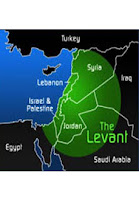 |
| Levant |
Ø Levant / ləˈvænt / (লএˈভ্যান্ট্) n [the Levant is a historical geographical term, referring to a large area in the eastern Mediterranean] (লেভ্যান্ট যা পূর্ব ভুমধ্যাঞ্চল নামেও পরিচিত, আনাতোলিয়া এবং মিশর এর মাঝে অবস্থিত ভৌগোলিক ও সাংস্কৃতিক অঞ্চল):
Ø Worldwide / ˈwɜːrldwaɪd / (ˈওয়া্র্ল্ডওয়াইড্) adj [existing or happening in all parts of the world] (সারা বিশ্বজুড়ে): The story has attracted worldwide attention.
 |
| Grind |
Ø Grind / graɪnd / (গ্রাইন্ড্) v {Pt. Pp. Ground (গ্রাউন্ড্)} [to make Sth into small pieces or power by pressing between the hard surface or using a special machine] (ঘষে চূর্ণ বা গুঁড়া করা): The flour is ground using traditional methods.
 |
| Semolina |
Ø Semolina / ˌseməˈliːnə / (ˌছেমএˈলীনএ) n [a powder made from crushed wheat used for making pasta and, sweet dishes] (সুজি):
Ø Germinate / ˈdʒɜːrmɪneɪt / (ˈজা্র্মিনেইট্) v [when the seed of a plant to start growing] (<বীজ বিষয়ে> অঙ্কুরিত হওয়া বা করা): The beans will only germinate if the temperature is warm enough.
Ø Durum / ˈdʊrəm / (ˈডুরএম্) n [a type of hard wheat, used to make pasta] (এক ধরণের শক্ত গম):
Ø Malt /mɔːlt / (মোলট্) n [grain, usually barley, that has been left in water for a period of time and then dried, used for making of alcoholic drink such as beer and whiskey, etc.] (মদ্যাদি চোলাই এর জন্য যবাদি শস্যের মণ্ড; সীরা):
Ø Cracked Wheat / krækt wiːt / (ক্র্যাক্ট্ উঈট্) n [grains of wheat that have been crushed into small pieces] (গম চূর্ণ):
Ø Parboil / ˈpɑːrbɔɪl / (ˈপাঃর্বয়ল) v [to boil food for a short time. Until it is partly cooked] (<খাদ্যদ্রব্য> অর্ধসিদ্ধ করা):
Ø Steam / stiːm / (স্টীম্) n [the hot gas that is produced when water boils] (ভাপ; বাষ্প; ধোঁয়া): Steam rose from the boiling kettle.
<VERB> [to place food over boiling water so that it cooks in the steam; to be cooked in this way] (বাষ্পের সাহায্যে রান্না করা): steamed fish.
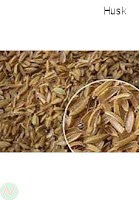 |
| Husk |
Ø Husk / hʌsk / (হাছক্) n [the dry outer covering of some seeds, especially of grain] (তুষ): Brown rice has not had the husks removed.
Ø Ingredient / ɪnˈgriːdiənt / (ইনˈগ্রীডিএনট্) n [food that is used with other foods in the preparation of a particular dish] (<রান্নার> উপাদান বা উপকরণ):
Ø Flatbread / flætbred / (ফ্ল্যাট্ব্রেড্) n [this is a bread made with flour, water, and salt, and then thoroughly rolled into flattened dough.] (হাত রুটি; সমান রুটি):
 |
| Dough |
Ø Dough / doʊ / (ডাউ) n [a mixture of flour, water, etc. that is made into bread and pastry] (মাখা ময়দার তাল): She kneaded the dough and left it to rise.
 |
| Pie |
Ø Pie / paɪ / (পাই) n [a type of food made with meat, cereals, and vegetables or fruit covered in pastry and baked] (বড়া): Would you like some more mutton pie?
Wheat Germ
Wheat germ / ˈwiːt dʒɜːrm / (ˈউঈট্ জা্র্ম) n [the middle part of a grain of wheat,
sometimes added to other food, especially bread, because it contains substances
that is good for health] (গমের শাঁস):
Bran
Bran / bræn / (ব্র্যান্) n [the outer skin of grain that is left when the grain has been used to make white
flour, that is added to other foods because it contains a lot of the fiber
needed for a healthy body] (ভুসি): Fresh fruits and
vegetables are important and so is bran.
Durum Wheat
Durum wheat / ˈdʊrəm ˌwiːt / (ˈডুরাম ˌউঈট্)
n {Also durum} [a kind of hard wheat with
a high gluten content, grown in arid regions, having bearded ears and yielding
flour that is used chiefly to make pasta] (ডুরাম
উঈট <একধরণের গম>):
Paddy
Paddy / ˈpædi / (ˈপ্যাডি) n 1. {Also paddy field; rice
seeds; US rice paddy} [a field that
is kept flooded with water and is used for growing rice]
(ধান; ধান গাছ): a rice paddy
2. Paddy / ˈpædi / (ˈপ্যাডি) n {Also temper} [a state of being angry or in a bad mood] (বিষম
রাগ): There is no need to get into
a paddy.
Rice
Rice / raɪs / (রাইছ্) n [rice is the seed of the grass species with short, narrow white or brown grain grown on a wetland in hot countries as food. As a cereal grain, it is the most widely consumed staple food for a large part of the world’s human population, in Asia. It is the agricultural commodity with the third-highest worldwide production. Rice is the most important grain with regard to human nutrition and calorie intake.
The varieties of rice are typically classified as long-, medium-, and short- grained. The grains of long-grain rice tend to remain intact after cooking; medium-grain rice becomes stickier. Medium-grain rice is used for sweet dishes. Stickier medium-grain rice is used for sushi, the stickiness allows the rice to hold its shape when molded. Short-grain rice is often used for rice pudding. Rice porridge is commonly eaten as a breakfast food, and is also a traditional food for the sick] (চাল; চাউল): Do you prefer brown rice or white rice?
Ø Species /ˈspiːʃiːz / (ˈস্পীশীজ্) n [a group in which animals, plants, etc. that are able to breed with each other and produce healthy young are divided, smaller than a genius and identified by a Latin name] (প্রজাতি):
Ø Wetland / ˈwetlənd / (ˈওএটলএন্ড্) n [a large area of land covered with swamp or marsh] (জলাভূমি):
Ø Regard / rɪˈgɑːrd / (রিˈগাঃর্ড্) n [attention to or thought and care for Sb/Sth] (আলোচ্য বিষয়; সম্বন্ধ; প্রসঙ্গে):
<IDM> In/with regard to Sb/Sth [concerning Sb/Sth] (সম্পর্কে; বিষয়ে): The company’s Position with regard to overtime is made clear in their contracts.
Ø Nutrition / nuˈtrɪʃn / (নিউˈট্রিশ্ন্) n [the process by which living things receive the food necessary for them to grow and be healthy] (পুষ্টি): Nutrition information is now provided on the back of most food products.
Ø Intake / ˈɪnteɪk / (ˈইনটেইক্) n [the amount of food, drink, etc. that you take into your body] (<খাদ্য> গ্রহণ): to reduce/cut your daily intake of salt.
Ø Intact / ɪnˈtækt / (ইনˈট্যাক্ট্) adj [complete and in the original state] (অক্ষত; অখণ্ড; অক্ষুন্ন্): Most of the house remains intact even after the earthquake.
<SYN> Undamaged
<SYN> Undamaged
Ø Sushi / ˈsuːʃi / (ˈসূশি) n [a Japanese dish of small cakes of cold cooked rice, flavored with vinegar and served with raw fish, etc. on top] (সুশি <এক ধরণের জাপানী খাবার>):
 |
| Mould |
Ø Mould / moʊld / (মৌল্ড্) v {Pt. Pp. molded // ()} [to make a soft substance a particular shape or object by pressing it] (দলা করা; ছাঁচ তোলা): This plastic is going to be molded into plates.
Ø Pudding / ˈpʊdɪŋ / (ˈপুডিং) n [(in the UK) a sweet and usually hot dish made with pastry, flour, bread or rice and often fruit] (পায়েস; মিষ্টান্য দ্রব্য): I have not made a pudding today.
 |
| Porridge |
Ø Porridge / ˈpɔːrɪdʒ / (ˈপোরিজ্) n [a type of soft thick white food made from cereal boiled in milk
Basmati
Basmati / bæsˈmæti / (ব্যাছˈম্যাটি) n {Also basmati rice} [a type of long-grain Indian rice with a delicate
flavor] (বাসমতী <চাল>):
Sweetcorn
Sweetcorn / ˈswiːtkɔːrn / (ˈসুঈটকোর্ন) n {US, UK corn} [the yellow
seeds of a type of maize plant also called sweetcorn, which grows on
thick stems and are eaten as a food, made into flour]
(ভূট্টা): Roasted sweetcorn is a very popular snack food in Bangladesh,
India, and Pakistan.
Maize / meɪz / (মেইজ্) n {UK, US corn} [a tall plant which produces long ears
covered with yellow seeds called sweetcorn, which is eaten as food, made into
flour, or fed to animals] (ভূট্টার
গাছ):
Ø Roast / roʊst / (রৌছ্ট্) v {Pt. Pp. roasted /
roʊstɪd / (রৌছ্টিড্)} [to heat nuts, maize, etc. in order to
dry them and turn them brown, or to be cooked in this way] (তাপ দেওয়া বা সেঁকা;
ভাঁজা): roasted maize
Maize
Maize / meɪz / (মেইজ্) n {USA corn} [a tall plant grown for its large yellow grains that are used for making flour or eaten as a vegetable; the grains of this plant is maize, known in some English-speaking countries as corn, and in the United Kingdom as sweetcorn, is a large grain domesticated by indigenous peoples in Mesoamerica in prehistoric time. The leafy stalk produces ears, which contain the grain, which are seeds called kernels. Its kernels are often used in cooking as a starch. The six major types of maize are dent, flint, pod, popcorn, flour and sweet.
Maize and cornmeal constitute a staple food in many regions of the world. Popcorn consists of kernels of certain varieties that explode when heated, forming fluffy pieces that are eaten as a snack. Roasted maize is a very popular snack food in Bangladesh, India, and Pakistan. Maize can also be harvested and consumed in the unripe state when the kernels are fully grown but still soft. Unripe maize must usually be cooked to become palatable; this may be done by simply boiling or roasting the ears. Maize is a major source of starch. Cornstarch is a major ingredient in home cooking and in many industrialized food products.] (ভূট্টার গাছ):
Ø Domesticate / dəˈmestɪkeɪt / (ডএˈমেছটিকেইট্) v {Pt. Pp. domesticated / dəˈmestɪkeɪtɪd / (ডএˈমেছটিকেইটিড্)} [to bring animals or plants under human control in order to provide food, power or companionship] (<পশুপাখি ও গাছপালা সম্পর্কে> পোষমানানো): Dog was probably the first animals to be domesticated.
Ø Indigenous / ɪnˈdɪdʒənəs / (ইনˈডিজএনএছ্) adj [belonging to a particular place rather than coming to it from somewhere else] (দেশজ; দেশী; আদি অধিবাসি): The kangaroo is indigenous to Australia.
<SYN> Native /ˈneɪtiv / (ˈনেইটিভ) adj
Ø Prehistoric / ˌpriːhɪˈstɔːrɪk / (ˌপ্রীহিˈছটোরিক্) adj [connected with the time in history before the information was written records] (প্রাগৈতিহাসিক): prehistoric man/plants/animals/burial sites. In prehistoric time
 |
| Stalk |
Ø Stalk / stɔːk / (স্টোক্) n [a thin stem that supports a leaf, flower or fruit and joins it to another part of the plant or tree; the main stem of a plant] (পুষ্পাবৃন্ত; পত্রবৃন্ত; বোঁটা): Flowers on long stalks.
 |
| Ear |
Ø Ear / ɪr / (ইএর) n [the top part of a grain plant, such as wheat, which later contains the grains which are used as food] (শিষ; শস্যের মঞ্জরি): ears of corn
 |
| Popcorn |
Ø Popcorn / ˈpɑːpkɔːrn / (ˈপাঃপকোর্ন্) n [a type of food made from grains of maize (corn) that are heated until they bust forming light whitish balls that are then covered with salt or sugar] (ভূট্টার খৈ):
Ø Consist / kənˈsɪst / (কএনˈছিছ্ট্) v
<PHR-V> consist of [to be made of or formed from something] (গঠিত হওয়া): Their diet consisted largely of vegetables.
Ø Explode / ɪkˈsploʊd / (ইকˈছপ্লৌড্) v {Pt. Pp. exploded / ɪkˈsploʊdɪd / (ইকˈছপ্লৌডিড্)} [to break up into pieces violently] (বিস্ফোরিত হওয়া/করা; ফেটে পড়া):
Ø Fluffy / ˈflʌfɪ / (ˈফ্লাফি) adj [(of food) soft, light and containing air] (তুলার মতো ফুলোফুলো; তুলতুলে): Beat the butter and sugar until they are soft and fluffy.
 |
| Roasted Maize |
Ø Roast / roʊst / (রৌছ্ট্) v {Pt. Pp. roasted / roʊstɪd / (রৌছ্টিড্)} [to heat nuts, maize, etc. in order to dry them and turn them brown; or to be cooked in this way] (তাপ দেওয়া বা সেঁকা; ভাঁজা): roasted maize
Ø Palatable / ˈpælətəbl / (ˈপ্যালএটএব্ল্) adj [(of food or drink) having a pleasant or acceptable taste] (সুস্বাদু; মুখরোচক): The meal was barely palatable. A very palatable local wine.
Ø Cornstarch / ˈkɔːrnstɑːrtʃ / (ˈকোর্নস্টাঃর্চ্) n [fine white flour made from corn(maize), used especially for making sauces thicker] (ভূট্টার ময়দা):
<SYN> (BRE) Corn Flour
<SYN> (BRE) Corn Flour
Barley
Barley / ˈbɑːrli / (ˈবাঃর্লি) n [a plant grown for its grain that is used for making food, beer, and whiskey; the grains of the thin plant are barley, a member of the grass family is a major cereal grain grown in temperate climates globally. It has been used as animal fodder, as a source of ferment material for beer and certain distilled beverages, and as a component of various cultures] (যব): Half of the United States’ barley production is used as livestock feed.
Ø Whisky / ˈwɪski / (ˈহুউছকি) n [a strong, pale brown alcoholic drink, originally from Scotland and Ireland, made from grain such as barley, maize or rye] (কড়া মদবিশেষ):
Ø Temperate / ˈtempərət / (ˈটেমপএরএট্) adj [(of weather conditions) having a mild temperature without extremes of heat or cold] (<আবহাওয়া ও জলবায়ু সংক্রান্ত> নাতিশীতোষ্ণ): a temperate climate
 |
| Ferment |
Ø Ferment / fərˈment / (ফএরˈমেনট্) v [to cause a chemical because of the action of yeast or bacteria, often changing sugar to alcohol; to make Sth change in this way] (<জীবানুঘটিত রাসায়নিক পরিবর্তনের কারণে> গাজিয়ে ওঠা/তোলা; খামির হওয়া /করা): Fruit juices ferment if they are kept for too long.
Ø Distil / dɪˈstɪl / (ডিˈছটিল্) v {Pt. Pp. distilled / dɪˈstɪld / (ডিˈছটিল্ড্)} [to make a liquid pure by heating it until it becomes a gas, then cooling it and then collecting the drops of liquid that form] (পাতনের সাহায্যে তরল পদার্থ শোধণ করা; চোলাই করা): To distill fresh water from seawater.
Ø Beverage / ˈbevərɪdʒ / (ˈবেভএরিজ্) n [a drink of any type] (যে কোনো ধরণের পানীয়): Hot beverage include tea, coffee, and hot chocolate.
Rye
Rye / raɪ / (রাই) n [it is a grass grown extensively as a grain. It is a member of the wheat tribe and is closely related to barley and wheat. Rye grain is used for flour, rye bread, rye beer, crisp bread, some whiskeys, some vodkas and animal fodder. It can be eaten the whole also.] (রাই): rye bread/whiskey
Ø Extensive / ɪkˈstensɪv / (ইকˈছটেনছিভ্) adj [covering a large area; having a great in amount] (ব্যাপক; বিশাল): He suffered extensive injuries in the accident.
<ADV> Extensively (=ব্যাপকমাত্রায়): a spice used extensively in Eastern cooking.
<ADV> Extensively (=ব্যাপকমাত্রায়): a spice used extensively in Eastern cooking.
Ø Tribe / traɪb / (ট্রাইব্) n [(biology) a group of related animals or plants] (<উদ্ভিদ ও প্রাণী> সমশ্রেণীর গাছপালা; একই বংশোদ্ভুত প্রাণী): a tribe of cats
Ø Crisp / krɪsp / (ক্রিছ্প্) adj {Also crispy} [pleasantly hard and dry] (<খাদ্যসংক্রান্ত> মচমচে): Bake until the pastry is golden and crisp.
Ø Vodka / ˈvɑːdkə / (ˈভাঃডকএ) n [a colorless strong clear alcoholic drink, made from grain, originally from Russia] (ভদকা): I will have a vodka and lime.
Oats
Oats / oʊts / (ওটছ্) n [oats, sometimes called the common oats, is a species of cereal plant like a grass grown for its seed, which is known by the same name. While oats are suitable for human consumption as oatmeal or porridge, one of the most common uses is as livestock feed] (যাব; জই): These biscuits contain oats. Rolled oats
Millet
Millet / ˈmɪlɪt / (ˈমিলিট্) n [millets are a group of highly variable small-seeded grasses, widely grown around the world as cereal crops or grains for fodder and human food. They are important crops in the semi-arid tropics of Asia and Africa, with 97% of millet production in developing countries, in the developed world, millets are less important. The crop is favored due to its productivity and short growing season under dry, high-temperature conditions.] (জনারি; জওয়ার):
Ø Variable / ˈveriəbl / (ˈভেরিএব্ল্) adj [often changing; likely to change] (পরিবর্তনশীল; পরিবর্তনীয়): British weather is perhaps at its most variable in the spring.
<SYN> Fluctuating
Ø Semi-arid / ˈsemi- ˈarid / (ˈছেমি-ˈএ্যারিড্) adj [(of land or climate) describes an area or climate with a little rain but not completely dry] (অর্ধ-অনুর্বর):
 |
| Arid |
Ø Arid / ˈærɪd / (ˈএ্যারিড্) adj [(of land or climate) having little or no rain; very dry] (<জমি সম্বন্ধে> অনুর্বর; <আবহাওয়া সম্বন্ধে> শুষ্ক; বৃষ্টিপাত হীন): The desert is so arid that nothing grows there.
Foxtail millet / fɑːksteɪl ˈmɪlɪt / (ফাঃক্স্টেইল্ ˈমিলিট্) n [a
cultivated annual grass with dense, lobed, bristly spikes containing small
grains, grown in Eurasia for grain and forage and in North America chiefly for
hay and birdseed] (কাউন):
Sesame
Sesame / ˈsesəmi / (ˈছেছএমি) n [sesame is a flowering plant. It is widely naturalized and cultivated for its edible seed, which grows in pods. Sesame is highly tolerant of drought-like conditions and grows where other crops may fail. It has one of the highest oil contents of any seed, with a rich, nutty flavor, it is a common ingredient in cuisines across the world. Sesame fruit is a capsule, the fruit naturally splits open to release the seeds by splitting along the sepal from top to bottom. It is used whole in cooking for its rich, nutty flavor. Its seeds are sometimes added to bread including bagels and the tops of burger buns. Fast-food restaurants use buns with tops sprinkled with sesame seeds. ] (তিল):
Ø Naturalize / ˈnætʃrəlaɪz / (ˈন্যাচরএলাইজ্) v [to introduce a plant or an animal to a country where it is not native] (<প্রাণী বা উদ্ভিদ> অন্য দেশে নিয়ে সেখানকার জলবায়ুতে অভ্যস্ত করা; স্বভাবীভূত করা): The grey squirrel is now naturalized in Britain.
<SYN> Adapt
Ø Content / ˈkɑːntent / (ˈকাঃনটেনট্) n [the amount of a substance that is contained in Sth else] (আধেয়; অভ্যন্তরস্থ বস্তু): The contents of his bag spilled all over the floor.
Ø Nutty / ˈnʌti / (ˈনাটি) adj [tasting of or containing nuts] (বাদামের মতো স্বাদযুক্ত): a nutty taste
 |
| Capsule |
Ø Capsule / ˈkæpsjuːl / (ˈক্যাপছূল্) n [a shell or container for seeds or eggs in some plants and animals] (বীজকোষ):
Ø Sepal / ˈsepl / (ˈছেপ্ল্) n [a part of a flower, like a leaf, that lies under and supports the petals. Each flower has a ring of sepals called a calyx] (ফুলের বৃত্তের অংশ বিশেষ; বৃত্যাংশ):
 |
| 1. Bun |
Ø Bun / bʌn / (বান্) n 1. [a small round piece of bread, especially one which is cut horizontally and holds a burger] (কিশমিশযুক্ত ক্ষুদ্র গোলাকার সুমিষ্টি রুটিবিশেষ): a hamburger bun
 |
| 2. Bun |
Bun / bʌn / (বান্) n 2. [a woman’s hairstyle where the hair is brought together into a round shape at the back of the head or on top] (খোঁপা): She wore her hair in a bun.
 |
| Sprinkle |
Ø Sprinkle / ˈsprɪŋkl / (ˈস্প্রিঙক্ল্) v {Pt. Pp. sprinkled / ˈsprɪŋkld / (ˈস্প্রিঙক্ল্ড্)} [to shake small pieces of Sth or drops of a liquid on Sth] (<কোনোকিছুর উপর কিছু> ছড়িয়ে বা ছিটিয়ে দেওয়া): She sprinkled sugar over the strawberries.
<SYN> Dust; Scatter
Sago
Sago / ˈseɪɡoʊ / (ˈছেইগৌ) n [a hard
and small white grains that are obtained from a part of the trunk of a type of
palm tree, is used for making sweet cooking] (সাগু; সাগুদানা; সাবু): sago dessert
Flax
Flax / flæks / (ফ্ল্যাক্ছ্) n [It is a food and fiber crop that is known in cooler regions of the world grown for its stem that is used to make a thread and its seeds, that are used to make linseed oil. The textile made from flax is known in the West as linen. Flax seed sprouts are edible, with a slightly spicy flavor, and is roasted, powdered, and eaten with boiled rice] (তিসি; শন):
Ø Textile / ˈtekstaɪl / (ˈটেকছ্টাইল্) n 1. [any type of cloth made by weaving or knitting] (বস্ত্র; বস্ত্রবয়ন সংক্রান্ত): The textile industry. A textile designer.
Ø Textile / ˈtekstaɪl / (ˈটেকছ্টাইল্) n 1. [any type of cloth made by weaving or knitting] (বস্ত্র; বস্ত্রবয়ন সংক্রান্ত): The textile industry. A textile designer.
<SYN> Fabric
2. Textiles [=the industry that makes cloth] (বস্ত্রকল): He got a job in textiles.
 |
| Linen |
Ø Linen / ˈlɪnɪn / (ˈলিনিন্) n [a type of cloth made from the fiber of the flax plant] (কাপড়): a linen jacket.
Sorghum
Sorghum / ˈsɔːrgəm / (ˈছোর্গএম্) n [it is flowering plants with very small grain grown as food in tropical regions] (জোয়ার):
Quinoa
Quinoa / kɪnˈwɑː / (কীন্ˈওয়া) n [a South
American plant, grown for its round small seeds, that is eaten like a grain and
popular as a health food and make alcoholic drinks]
(চন্দন বেটু; বটুয়া):
Buckwheat
Buckwheat / ˈbʌkwiːt / (বাক্ঊঈট্) n {Also common buckwheat} [a short-season crop cultivated for its grain-like
seeds and as a cover crop is a
domesticated food plant raised in Asia, used for feeding animals and making
flour] (বাজরা):
Ø Cover crop / ˈkʌvər
krɑːp / (ˈকাভএর
ক্রাঃপ্) n [planted between main
crops to manage soil erosion, soil fertility, soil quality, water, weeds,
pests, diseases, biodiversity, and wildlife in an agroecosystem, they may be an
off-season crop planted after harvesting the cash crop, and may grow over
winter] (মাটির
বন্ধু ফসল):

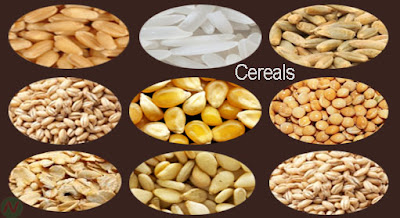


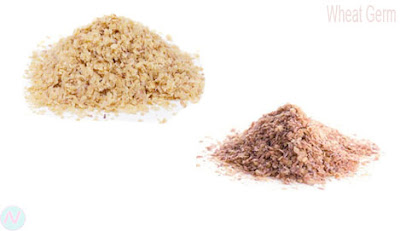











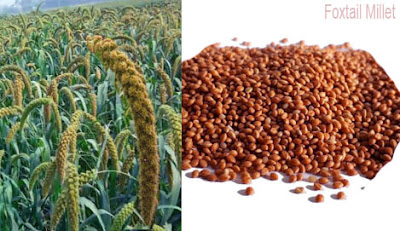
















No comments